NEWS
March 2025
The Adrian Piper Research Archive Foundation is pleased to announce the selection of its MultidisciplinaryFellow for 2025
The Adrian Piper Research Archive Foundation
supports research that exemplifies, models, analyses
and/or theorizes the divergent multidisciplinary expressions
of the self encouraged by globalization and cross-cultural journeying.
11 March 1998, 6:00 – 9:40 PM
Jerry’s
101 Prince St., SoHo
NYC
ORIGINAL AUDIO RECORDINGS:
Twin Disk CD
Set available for rental from
the Adrian Piper Research Archive Foundation
EDITED TRANSCRIPT:
Book
Publication available
for purchase
from
A.R.T. Press
Art Resources Transfer, Inc.
526 West 26th Street, #614
New York, NY 10001
USA
www.artresourcestransfer.org
Portikus
Alte Brücke 2/ Maininsel
D-60594 Frankfurt am Main
Germany
23 November 2024 – 9 February 2025
Adrian Piper, Who the Hell Do You Think You Are? (2016, Page project for Artforum 2016 Summer Issue, collage image #3 of 7),
The new foundation is called the Adrian Piper Research Archive Foundation. It is a Scottish Charitable Incorporated Organization [SCIO], an independent and self-sufficient entity based in Edinburgh, Scotland, UK. Its mission is to advance the same charitable goals as those for which the APRA Foundation Berlin was originally established in 2009. That original foundation has applied to the German authorities for permission to advance these goals by donating its assets to further the mission of the Adrian Piper Research Archive Foundation. More information about both foundations is available through the Gateway of this website, which has been updated accordingly. Take a look!
WAHLKAMPAGNE:
Eine Kunstaktion zur Bildungspolitik.
Denkbare Möglichkeit:
Ein dreiteiliges Kunstwerk, das spätestens am 1. Januar 2021 (also im Jahr der Bundestagswahl) eröffnet, und solange andauert, bis jede Klasse auf jeder Stufe, in jeder Schule und Universität, in jedem Fachbereich, in jedem Bundesland das 15:1 maximal wirksame Studierende/Lehrer*in Verhältnis erfüllt.
The Multi-Purpose Model

Finally figured out what to do with
all that toilet paper I’ve been hoarding.
The new, stylish, Casper-The-Friendly-Ghost look

This is not the first time I have regretted rejecting my mother’s offer
to teach me how to use a sewing machine.
I regret firms that price-gouge the protective masks they could produce
gratis and en masse even more.
STICK ‘EM UP!!! Just like in the Wild West.

I understand that gun sales in the U.S. are skyrocketing.
Here in Europe, we don’t need guns.
We just need to take out our hankies and use them.

Patanjali
Compiler and editor of the Yoga Sutra
A Personal Best
I started learning the Yoga Sutra by heart in late 2012. For a serious yoga practitioner, this is a small but important part of the process by which you program your mind to be in the right place at the moment of death. If you fail to do this, you might come back as a cockroach. If you succeed, you still might come back as a cockroach, if you have failed to prepare in other ways. The Yoga Sutra explains systematically what you have to do, why, and how, in order not to come back as a cockroach. Actually it explains what you have to do in order not to come back at all. That is the ultimate goal. Learning the text by heart is only a precondition for understanding the road map. And I am only in the beginning stages even of that much. At this point, I’m happy to report, I can recite all 195 sutras in sequence, beginning with Book I, Sutra 1, and ending with Book IV, Sutra 34. That is, I can do this on a good day. On a mediocre day, I can do it for Books I and II, but my mind wanders around the middle of Book III and I discover I’ve forgotten my place in the sequence when I try to bring it back. Or I lose my focus and allow the reoccurrence of a word or phrase from a previous sutra to lead me off on a detour in which I end up repeating that word in the earlier sutra and several of the sutras that follow it, before realizing that I’ve already been there. On a really bad day, my mind both wanders and also gets stuck in the endless loop for several seconds before I realize I’ve lost my place in the sequence. At that point I have to just go back and read the text out loud. Happily, that is always a pleasure rather than a punishment. Daily repetition instills the correct sequence more deeply, increases the occurrence of good days, and decreases the occurrence of mediocre or bad days. Perversely, my concentration on Book IV is still relatively good, precisely because I started learning it most recently and so have to be more present for it. So I’m still having mostly good days with this one. But I can’t yet pull just any sutra out of sequence and recite it. And I can’t yet isolate a sequence of sutras and recite them. That comes later, when I resume studying the commentaries. At the beginning, you’re not supposed to worry too much about what the sutras mean. You’re just supposed to focus on the sound and rhythm of the words. Because I taught them before I began to learn them, I mostly do know what they mean. But I don’t let that get in the way. At this stage I’m more concerned about my atrocious Sanskrit pronunciation.
The APRA Foundation Berlin is pleased to announce a new section of the APRA website offering a comprehensive scholarly resource for museum studies specialists and other interested researchers working on Adrian Piper: A Synthesis of Intuitions 1965-2016. It offers in-depth information about key personnel and statistics, selected installation shots, a walk-through video of the installation, a detailed architectural floor plan, symposia video documentation, publications, and selected reviews.
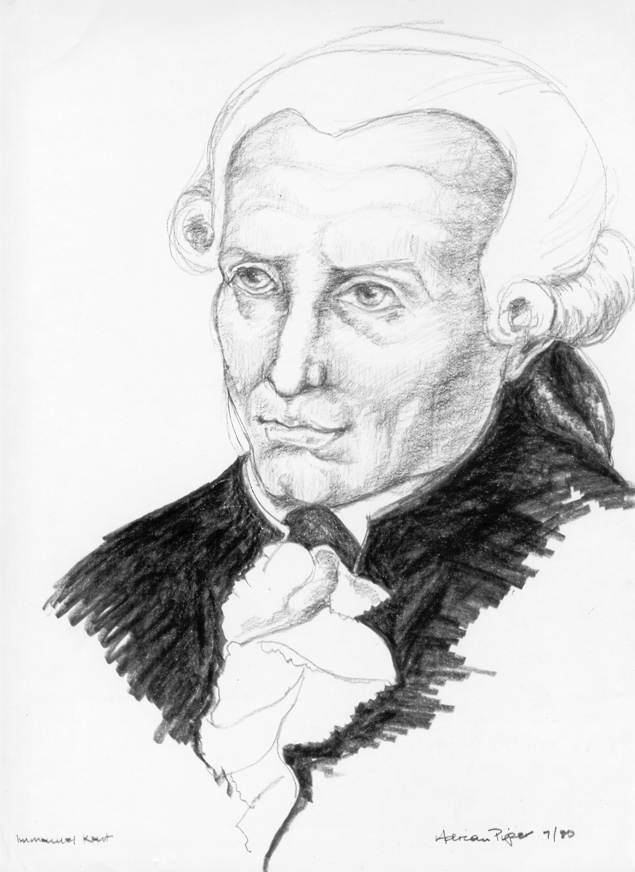
Adrian Piper, Immanuel Kant, 1980. Pencil drawing on paper, 9” x 12” (22.86 cm x 30.48 cm). Collection Albert Landau. © Adrian Piper Research Archive Foundation Berlin.
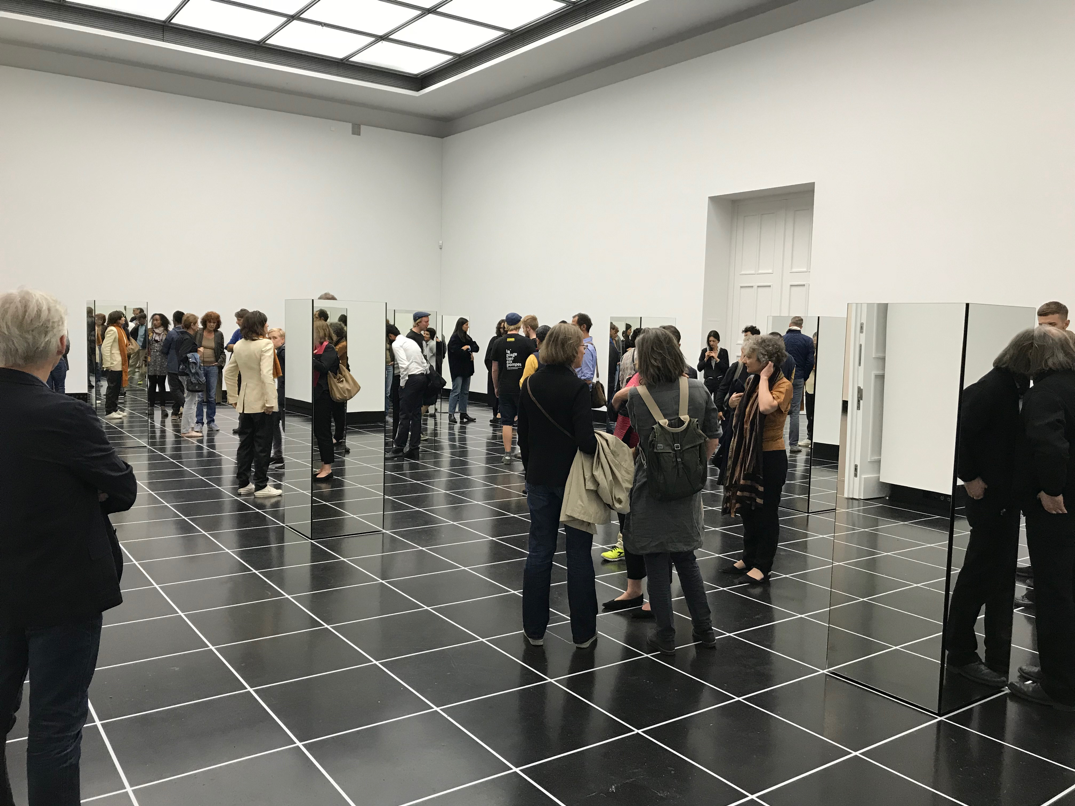
Adrian Piper, Das Ding-an-sich bin ich, 2018. Eight mirror cubes, each 180 × 60 × 60 cm (70.86” × 23.62” × 23.62”), each housing concealed sound system; eight 8-minute audio files; floor-wide grid of 60 cells each 60 × 60 cm (23.62” × 23.62”). Room dimensions variable. Installation view Akademie der Künste. Photo credit: Constantin Schroeder. Collection and © Adrian Piper Research Archive Foundation Berlin.
With the kind support of the Cologne Kreissparkasse which funds the Käthe Kollwitz Museum in Cologne.
Photo credit: Chris Tan
PUBLICATIONS
Adrian Piper: A Synthesis of Intuitions, 2018. Catalogue. New York:
Museum of
Modern Art.
Essays by Christophe Cherix,
David Platzker, Connie Butler, Adrian Piper.
Adrian Piper: A Reader, 2018. New York: Museum of Modern Art.
Essays by Jörg Heiser, Nizan Shaked, Kobena Mercer,
Diarmuid Costello, Elvan Zabunyan, Vid Simoniti.
Adrian
Piper, Escape to Berlin: A Travel
Memoir, 2018.
Berlin: APRA Foundation Berlin.
“Expansive and invaluable … Piper has expanded the very definition of political art, making this
retrospective feel superbly acute.”
The New Yorker
 ISBN
#978-3-9813763-4-0
ISBN
#978-3-9813763-4-0
"Takes on the urgency and and melodrama of a psychological thriller"
– The New York Times
"Brilliant and harrowing" – Artforum
"Brilliantly lucid, entirely engaging, destined to become a classic
American memoir"
-- Hyperallergic
 In 2005
Adrian Piper secretly emigrated from the United States. Several months passed before anyone
realized she had disappeared. She resurfaced in Berlin and has lived there ever since. Piper has
consistently and firmly refused to return to the U.S. or explain why she left. Many assume it
was because she discovered her name on the U.S. Department of Transportation Security’s
Suspicious Travelers Watch List. Others point to Wellesley College’s forcible termination of her
tenured Full Professorship. Yet others speculate that George W. Bush’s presidency, or American
racism, or the invasion of Iraq compelled her to leave. All of these conjectures are groundless.
ESCAPE TO BERLIN: A Travel
Memoir is a gripping autobiographical narrative that provides a full
account of the facts.
In 2005
Adrian Piper secretly emigrated from the United States. Several months passed before anyone
realized she had disappeared. She resurfaced in Berlin and has lived there ever since. Piper has
consistently and firmly refused to return to the U.S. or explain why she left. Many assume it
was because she discovered her name on the U.S. Department of Transportation Security’s
Suspicious Travelers Watch List. Others point to Wellesley College’s forcible termination of her
tenured Full Professorship. Yet others speculate that George W. Bush’s presidency, or American
racism, or the invasion of Iraq compelled her to leave. All of these conjectures are groundless.
ESCAPE TO BERLIN: A Travel
Memoir is a gripping autobiographical narrative that provides a full
account of the facts.
Adrian Piper, The Probable Trust Registry: The Rules of the Game #1-3, 2013-2017.
Installation + Group Performance. 3 grey walls reaching from floor to ceiling, 3 golden
circular desks, golden embossed letters, 3 lecterns, 3 lean stools, computer system, 3
receptionists (one behind each desk). Detail: The Rules of the Game #2. Photo Credit:
Anonymous. Collection Staatliche Museen zu Berlin, Nationalgalerie. © Adrian Piper Research
Archive Foundation Berlin.
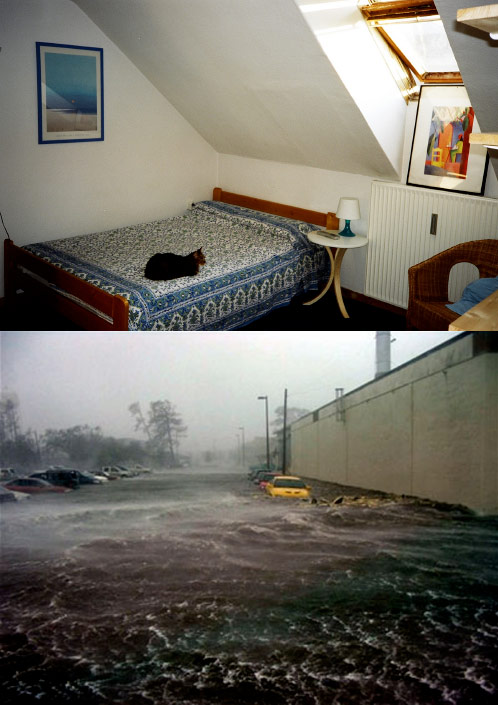
Vor genau zehn Jahren kam ich heimlich und uneingeladen am Flughafen Berlin-Tegel an, während Orkan Katrina an der Golfküste der USA wütete. Im Flugzeug sahen wir sprachlos die Bilder an. Mit Katies Hilfe brachte ich die zwei Katzen Ginger und Kali in der Flugkabine mit, und sendete alles übrige in drei großen Containern per Schiff. Ich hinterließ nichts. Während der ersten acht Wochen in Berlin, hatte ich in meiner kleinen Dachwohnung buchstäblich nur ein Dach überm Kopf. Ich wollte bloß weg, aus der Schußlinie entkommen, mich in Sicherheit befinden und in Ruhe gelassen werden. Seitdem habe ich doch fast keine Ruhe gehabt, sondern das beste Jahrzehnt meines Lebens, das mit so vielen Momenten reiner Freude und Befriedigung erfüllt worden ist, wie ich es mir hätte nie vorstellen können. Zahlreicher Frust und Hindernisse sind mir auch begegnet, aber daraus habe ich eine Lektion gelernt: nämlich, Ihr Deutschen seid verrückt, ewig hin- und hergerissen zwischen eurer enormen nach vorne strebenden Naturenergie, und euren findigen Strategien, sie zu hemmen und zu kanalisieren. Es ist mir ein Privileg dabei zu sein, um bezeugen zu können, wie sich eine abgesonderte Gesellschaft ohne das Gift von Rassismus allmählich wieder vereinigt; und durch die Verarbeitung ihrer Vergangenheit ihrer Zukunft sichert. Ich bete, Ihr werdet die neulich in Deutschland angekommenen Flüchtlinge mindestens demgemäß behandeln. Denn ich war auch mal einer, und Ihr wart gütig zu mir. Dadurch habt Ihr mir vor allem viel beigebracht, von dem Land, das ich hinter mir ließ. Schade, daß es euch nicht auch gelungen ist, mir eure verfluchte Sprache beizubringen (bei diesem Text hat mir Robert geholfen), während ich mein Englisch allmählich verliere. Nun müßt Ihr dafür büßen, durch die Qual, meine nun zweiseitig furchtbaren Sprachkenntnisse erdulden zu müssen. Auch Schade. Hauptsache ist aber, Ihr habt es für mich möglich gemacht, derartiges Leben zu führen, das meinen tiefsten Werten entspricht. Das hätte ich nicht geschafft, wenn ich die Entscheidung nicht getroffen hätte, hierher permanent einzuwandern. Ich riskierte alles dafür, und es hat sich gelohnt. Ich habe heute also sehr viel zu feiern. Auf das nächste Jahrzehnt bei euch freue ich mich riesig.
ADRIAN PIPER
THE
PROBABLE TRUST
REGISTRY
THE DESTINY AND INTERPRETATIONS OF THE WORK ARE PART OF THE WORK.

May 3-31
All proceeds from the sale, rental, exhibition, publication or production of work by Adrian Piper support the APRA Foundation Berlin (APRA), a research archive and website at adrianpiper.com established for the benefit of those students, scholars, curators, collectors, writers, and members of the general public who have a constructive curiosity or scholarly or professional interest in Piper's work in art, philosophy and yoga. APRA aims to promote a fuller and clearer understanding of the interconnections among these three areas in Piper's work; and to contribute over the long term to a more accurate, balanced, and complete comprehension of the conditions of production of Piper's entire body of work as a unified whole.
The APRA Foundation Berlin is pleased to announce a forthcoming series of print book and e-book editions of texts by Adrian Piper,
In the Margins Behind the Lines: Collected Writings
The volumes organize and present Piper’s writings in chronological order from 1967 to the present, with texts from all of the areas in which she has contributed – in art, philosophy, yoga and autobiography – placed side by side. This highlights lines of influence, correspondence, crosspollination and simultaneous development among these various fields, regardless of the institutional mores that often separate them. The volumes collect both previously published texts and illustrations, and also many that have never been published before. This definitive edition of Piper’s writings offers a new approach to her work, and to the large range of issues and themes with which it has been engaged for almost fifty years.

Thwarted Projects, Dashed Hopes, A Moment of Embarrassment,
digital projection
← Adrian Piper has decided to retire from being black.
In the future, for professional utility, you may wish to refer to
her as The Artist Formerly Known as African-American.

Adrian Piper, Artist Award for Distinguished Body of Work
"Since the late 1960s, the provocative and often challenging work of Adrian Piper has profoundly influenced the language and form of Conceptual art. Her 2010 exhibition Past Time: Selected Works 1973–1995, presented at Elizabeth Dee Gallery in New York, showcased several bodies of work that dealt with dissent in varying forms and represented a period of time widely considered as her most influential. Piper’s artistic practice flirts with the syntax of Minimalism and infuses it with explicitly political content, addressing issues of race, gender, and identity politics. Additionally, her work has been shaped by studies in philosophy, a subject on which she has lectured since earning a doctorate in the discipline thirty years ago. A keen interlocutor of mass culture, Piper has produced art and writing that make us question our constantly shifting contemporary social landscape.”
I did not read or discuss with John Bowles any part of his manuscript in advance of its publication. So I am relieved to be able to offer a qualified recommendation of his monograph. His knowledge of the historical period of the 1960s surpasses mine. His thorough factual research on my work of that period lends the book its authority. He situates my work of the late 1960s in the context of political and art - historical events that were going on in the art world at that time, thus drawing the reader’s attention to the broader significance of those works and relating them in interesting ways to the work of my peers, both local and international. The scholarship demonstrates a scrupulous fidelity to the historical documents, and is very mindful of the primary sources on which his theoretical interpretation is based.
I regret that I cannot endorse that theoretical interpretation. As the discussion moves forward in time, it shifts away from the public meaning of the work itself, toward unfounded psychoanalytic speculation about my possible motives in producing it; and is increasingly removed from the complex social, cultural and intellectual circumstances under which I actually produced that work. The politically incorrect reality is that I was socialized and accepted into a segregated “white” professional environment, because I failed to publicly announce my racial identity; and that my aesthetic values and preoccupations continued to reflect this socialization. So his dogged location of the work within the contemporaneous “black” art, poetry and popular culture communities is fictive.
The reproductions and design of the book are of very high quality. It is a useful secondary source on my work of the 1960s.
-- Adrian Piper
The APRA Foundation Berlin is pleased to announce the establishment of
The Berlin Journal of Philosophy
a blind-submission, double-blind, peer-reviewed, open-access journal that will publish articles on all topics in the four traditional major areas of philosophical specialization, namely
epistemology & metaphysics
logic
value theory
history of philosophy
and their established subspecialties.
The Journal innovates in adhering strictly to simultaneous policies of blind submissions,
double-blind review, and anti-plagiarism. For more information,
please visit
http://www.adrianpiper.com/berlin/berlinjphil/index.shtml.
The Berlin Journal of Philosophy is ©, administered and published by
the APRA Foundation Berlin,
an independent research organization
unaffiliated with any department, institute, school, college, university, or other academic institution.


Adrian Piper, Past Time: Selected Works 1973-1995 (installation shot)
Two Concurrent Solo Exhibitions:

Earlier Work:
Elizabeth Dee Gallery, 548 W. 22 St., NYC; 23 Oct-11 Dec 2010
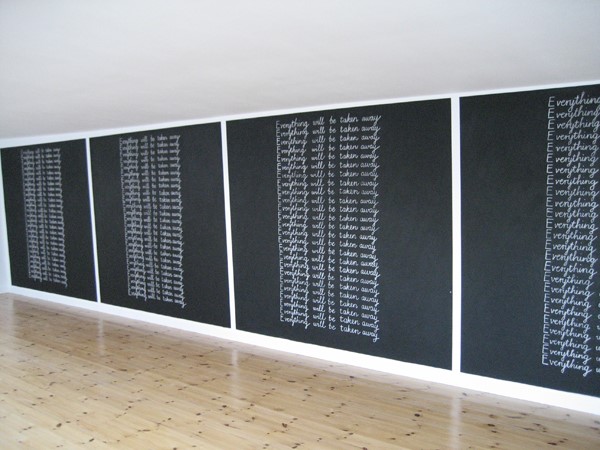
Adrian Piper, Everything #21 (2010; Installation: 4 blackboard walls, white chalk cursive handwritten text)

Recent Work:
Cairn Gallery, Pittenweem, Scotland; 23 Oct 2010-9 Jan 2011

In response to requests and some complaints (sorry), and to mark its second anniversary of publication, both volumes of
RATIONALITY
AND THE STRUCTURE OF THE SELF
are now available as two rather large singlefile PDF documents, with covers designed by the author.
Volume I: The Humean Conception
(9.7 MB) ISBN #978-3-9813763-0-2
can be downloaded here:
Volume II: A Kantian Conception
(8.5 MB) ISBN #978-3-9813763-1-9
can be downloaded here:
In lieu of an index (sorry again), each volume can be comprehensively searched using command-F or the search function at the APRA Foundation, Berlin website, here.
A hard-copy print version now in preparation will contain a detailed index of subjects and names.
The original chapter-by-chapter download version remains available for those who prefer (relatively) small sips.
Thanks very much for your feedback.
Sol LeWitt/Adrian Piper
Selected Infi
nite Extensio
ns Arbitraril
y Constrained
Duet Exhibition curated by John Sims
19 March – 3 May 2010
Opening 19 March, 5 – 7:30 PM
Reading: Mark Strand
Opening Performance by Adrian Piper:
One 16 Minute Long, Thickly Textured Straight Line
Running Parallel with the Bowery Poetry Club Floor
Bowery Poetry Club
308 Bowery
New York, NY
Performance: 1 May 2010, 2 – 3:30 PM
Bob Holman, Edwin Torres, Monica de la Torre
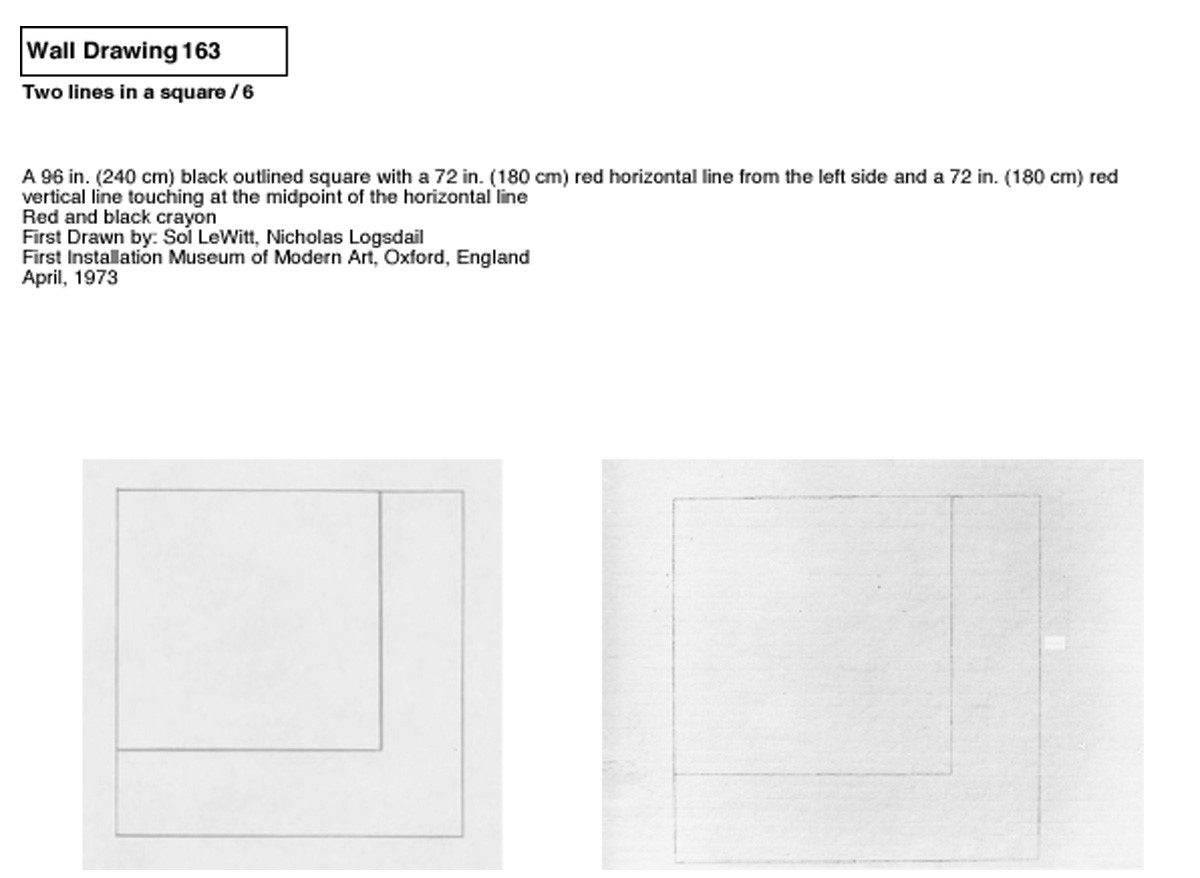
The Adrian Piper Research Archive is pleased to announce the establishment of the

The APRA Foundation Berlin supports research
that exemplifies, models, analyzes and/or theorizes
the divergent multi-disciplinary expressions of the self
encouraged by globalization and cross-cultural journeying.
Please visit http://www.adrianpiper.com/berlin/index.shtml
Mark well: one can be a strict logician or grammarian and yet be full of fantasy and music. One can be a musician or a beadplayer, and yet be devoted to law and order. The person whom we take as our ideal and try to emulate should be able at all times to exchange his art or science for any other, should allow the most crystal clear logic to radiate from his Bead Game and display the most creative fantasy in grammar. That is how we should be, and we should be prepared at any moment to be transferred to another post without opposition or allowing ourselves to become confused.
-- Hermann Hesse, Magister Ludi [Das Glasperlenspiel]
The United States Republican Party has finally capitulated to the need for more stringent government controls on free market activity in the American investment and commercial banking industry. They now acknowledge this as the ONLY solution to the global financial crisis engendered by the industry’s subprime mortgage lending practices.
But we know that this is only the most recent in an accelerating series of financial crises that began with the stock market crash of 1929 and the ensuing Great Depression, was braked temporarily by Roosevelt’s New Deal, and picked up steam with the post-war Reagan era’s Savings and Loan debacle of the late 1980s. Since then we have seen such debacles proliferate increasingly with each passing decade: the junk bond scam, the Mexican peso crisis, the IMF crisis, the IT bubble, Enron, and WorldCom are only a few examples.
The now-most prominent spokesman of the “permanent Republican majority,” Henry Paulson, has been quoted as advising Bush II that these debacles are part of normal market adjustment cycles that are to be expected “every 6, 8, 10 years” (Newsweek CLII, 13 (29 September 2008), page 29). I suggest that when these “normal market adjustments” accelerate to one such debacle per year, we should regard ourselves as having officially returned to Hobbes’ state of nature.
Many commentators have noticed the remarkable failures of memory that seem to prevent each new generation of financiers from learning the lessons of past crises that would enable them to avoid future ones, and that motivate each new generation of free-market enthusiasts in the U.S. Republican Party to roll
back regulatory legislation previously achieved. Bush II’s attempt to disembowel Social Security pensions for retirees is only one of the most shameful.
My online, open-access book Rationality and the Structure of the Self, Volume I: The Humean Conception (formally accepted for publication by Cambridge University Press) explains why these failures of memory are structurally endemic to the utility-maximization model of rationality so beloved by neo-classical economists. You can read the analysis here (see particularly Sections 2.3 and 3).
And my online, open-access book Rationality and the Structure of the Self, Volume II: A Kantian Conception (formally accepted for publication by Cambridge University Press) demonstrates what every intelligent person already knows: that utility-maximization MUST meet the cross-temporal consistency requirements of ordinary logic – and therefore, by implication, the constraints of nimble and judicious government regulation – in order to be rational. You can read the analysis here.
Comments welcome. Because of philosophy’s longstanding historical influence on political events and ideologies of all stripes (for example, of Rousseau on the French Revolution, Locke on the American Revolution, Marx on Communism, Nietzsche on the Second World War, Rawls' Difference Principle on Reaganomics), I think we need to conduct this discussion at a more thorough, sustained and systematic, non-ideological level if we are finally to break out of these “normal market adjustment cycles.”